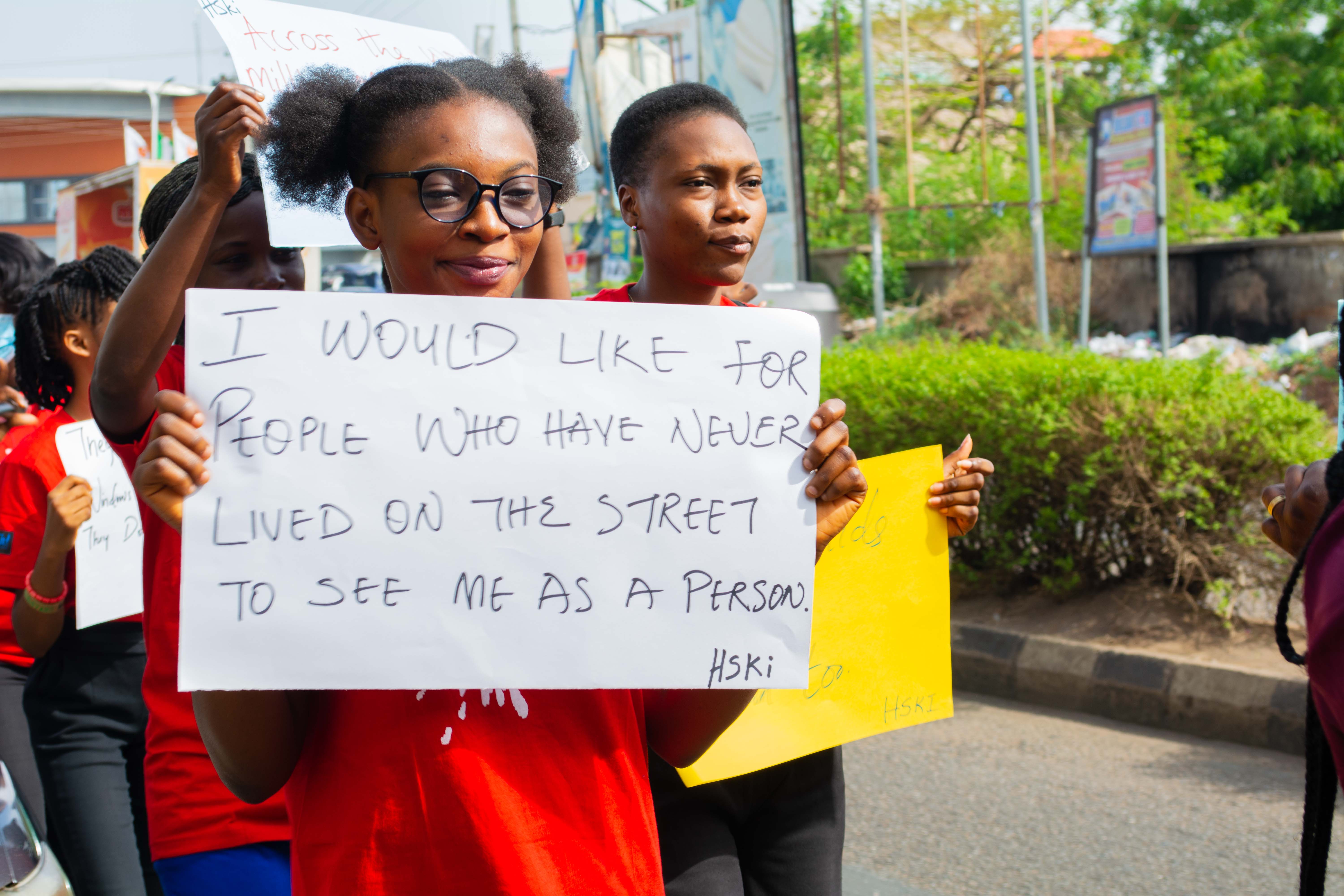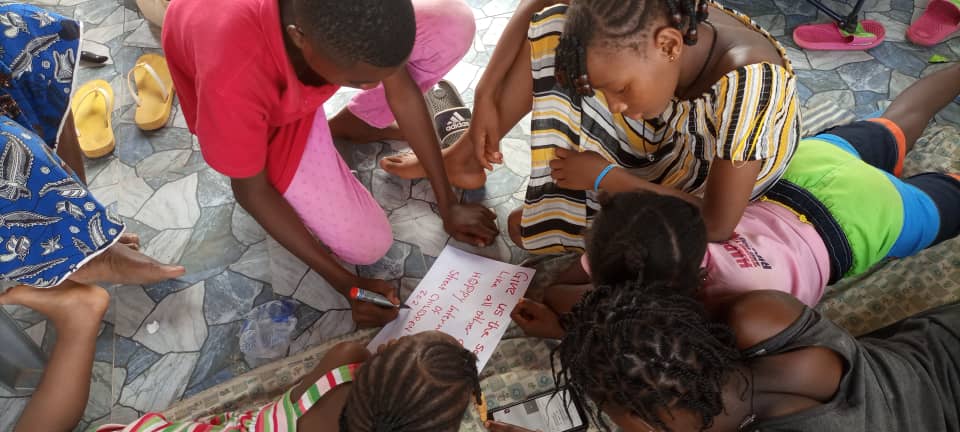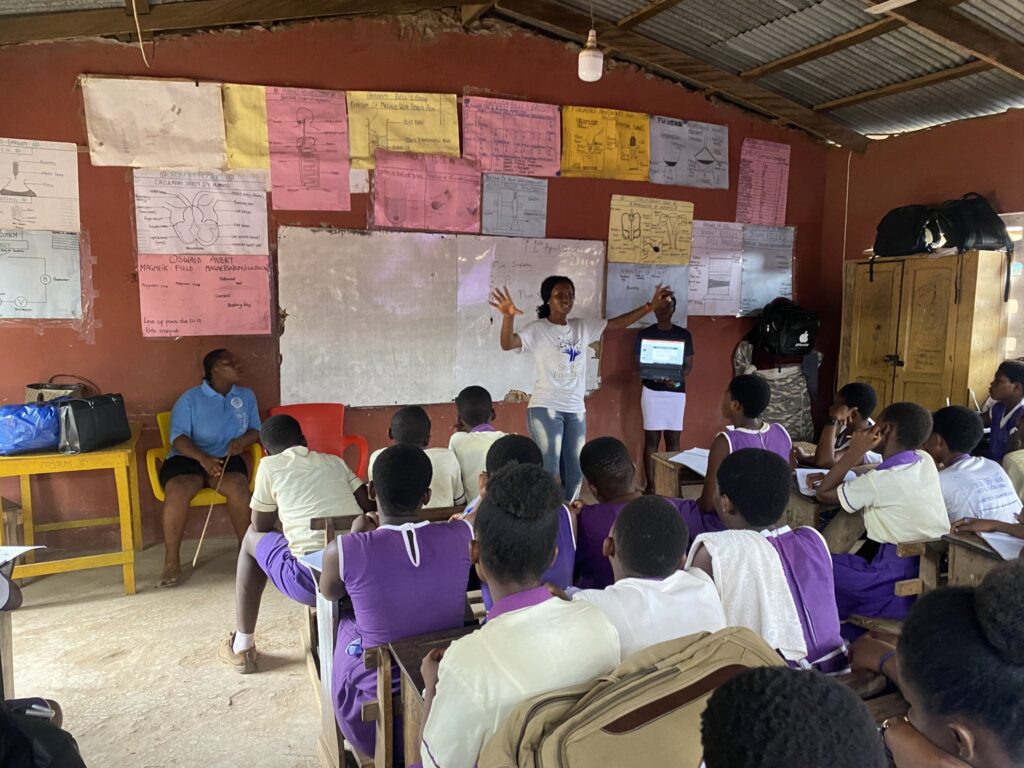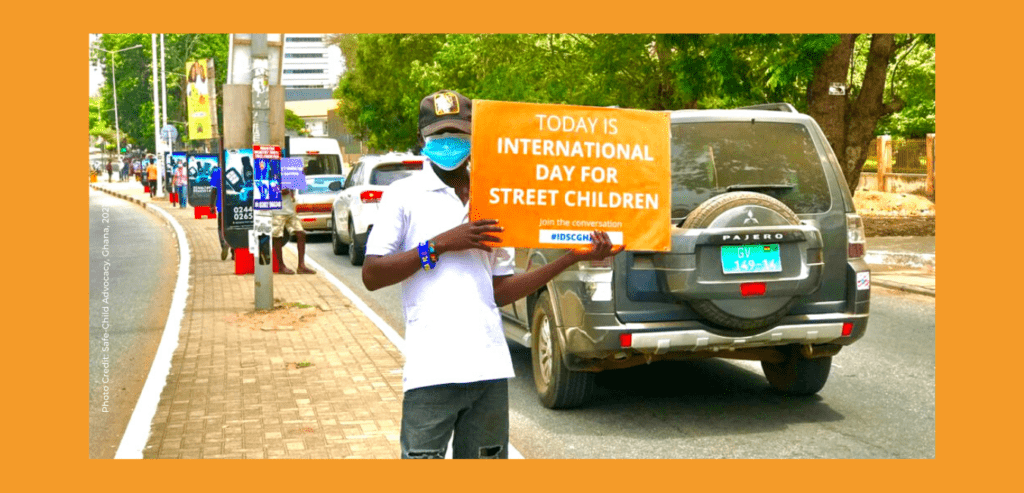Author: Louise Meincke and Katherine Richards
On this year’s International Day for Street Children, we’re celebrating frontline workers and reminding the world about the vital role they play.
Street child – what do those words evoke? Does it stir mental images of material need: a child desperate for shelter, better clothing, more regular meals, medicines, or to go to school?
We don’t know how many street children there are in the world because no single approach or comparable method exists to count them. Their mobility, fluidity, and lack of visibility in census data all make counting the exact number of street children in any given country, let alone globally, a difficult task.
However, we do know that there are significant numbers of children who depend on the street, for money, food, and friendships. For some living and working on the street may be seasonal, for others, it’s for most of their childhood and adolescence. Some live with street-dwelling families, while others come to the street to earn a living.

HSKi [Nigeria], held a march with street-connected children and frontline workers on IDSC 2021, carrying placards showing the children’s wishes and demands of decision-makers. Credit: Home and Street Kids Welfare Initiative, Nigeria, April 2021
Countries experiencing significant poverty, wealth inequalities, rural-urban migration, instability and young populations are at higher risk of children depending on the street for survival. Yet, street children can also be found in countries considered stable, safe and wealthy, which tells us that the pull and push factors for street life are varied and complex.
Street children show high levels of resilience and agency. However, the longer a child is dependent on the street for their survival, the more this experience is likely to impact their life chances. Street children are marginalised, stigmatised and hard to reach; they are some of the most vulnerable children in the world.
Interventions that focus on addressing their immediate survival needs and/or removing children from the street altogether, risk overlooking perhaps the most important need of all: to build a relationship of trust with an adult who listens to the child’s own view of what matters and puts the child first. An adult who is respectful of a child whose connection to the street plays a vital role in their everyday life and identity, and who navigates the often very difficult causes and consequences of depending on the street for survival.
That is why this year’s International Day for Street Children is celebrating the frontline workers who work with and advocate for street children, as part of the final step of a four-year campaign – ‘Four Steps to Equality for Street Children’. The campaign is calling for the full implementation of UN General Comment no. 21 on Children in Street Situations (2017) and the realisation of street children’s rights.
The General Comment is the UN Committee on the Rights of the Child’s interpretation of the rights set out in the UN Convention on the Rights of the Child, and clarifies the duties States have in relation to street children.
Street children consulted for the development of the General Comment spoke strongly about the need for respect, dignity and rights. In expressing their feelings, they said, among other things:
“Respect us as human beings.”
“I would like for people who have never lived on the streets to see us as persons with pride, like normal people.”
“It’s not about getting us off the streets and into shelters. It’s about giving us a status.”
“Living on the street does not mean that we can’t have other rights.”
“People should give us chance to use our gifts and talents to achieve our dreams.”
Following the four-step plan of the Four Steps to Equality campaign, governments around the world must enact their own strategies for ensuring safety and protection for street children. The first three steps are: 1. ‘Commit to Equality’; 2. ‘Protect Every Child’; and 3. ‘Provide Access to Services’. This year, focuses on the final fourth step, and calls for the creation of specialised solutions – the delivery of specialised services and opportunities that tune into the unique needs and challenges of street life.

Future Focus Foundation [Sierra Leone], held a workshop with street-connected children in April 2021, encouraging children to reflect on the essential services they need. Credit: Future Focus Foundation, Sierra Leone, April 2021.
What are these ‘specialised solutions’ and how are they created?
The frontline worker is key. It simply is not possible to deliver specialised solutions for street children – like street outreach work, family reunification, kinship and alternative care, and more – without them.
The International Day for Street Children gives us the opportunity to recognise the skills and dedication shown by frontline workers, and highlight the need to give this vital work the recognition and prioritisation it deserves.
Some may dismiss such frontline work, as ‘easy’ and ‘low skill’, but the reality is quite the opposite. It is a role that must be based on trust. It is about reciprocity and respect on both sides and is – in itself – based on an equal relationship between the street child and the frontline worker. Earning and retaining street children’s trust and delivering the high-quality specialised services they have the right to, services that are rooted in the specific contexts of children’s lives, requires a unique skillset. Frontline workers deserve proper support, recognition, and remuneration in delivering this work.
Too often, though, frontline work is deprioritised and low on the agenda for governments, funders and civil society organisations. That is if it is on the agenda at all. The UN Committee on the Rights of the Child calls on national and local governments to understand and support the critical role of frontline workers. Frontline workers should be respected as professionals, and while their work needs to be supported with appropriate training and guidelines, it is important to also value their own lived experiences and other skillsets.

Starlight Foundation and Adamfo Ghana, [Ghana], hold “Teach them Young” workshops focusing on streetism, hygiene, and personal safety, as part of their activities for IDSC 2022. Credit: Starlight Foundation and Adamfo Ghana, April 2022.
Bishnu Prasad Paudel, Assistant Project Manager for Child Protection, CWIN Nepal speaking at the Consortium for Street Children’s annual network forum said: “Street social workers [frontline workers] are always in a risky position, sometimes working at midnight, without anyone considering if this is safe or not […] if we are fighting for the issues of others [street children], somebody needs to think about the issues facing us.”
A frontline worker engages 24/7 and is committed to restoring street children’s sense of belonging, inclusion and trust based on an adult looking out for them. Frontline workers operate inside street children’s social environment, which is the street. While frontline workers may eventually support children to be reunited with family, or help ensure they are placed in appropriate alternative care settings, some children do not want to leave the street. And while this challenges our perception of where a child should grow up, a frontline workers’ priority is to listen to the child’s wishes and needs and provide solutions based on these. “Most children on the street may either have lesser or no such kind of interaction from most people on the street”, a frontline worker in Ghana reflected.
“Give us the opportunity to change our story”, said one street child consulted for the development of General Comment no. 21. Frontline workers are uniquely placed to help do just that. As Fr Patrick Shanahan, a key advocate for frontline workers, says, all street children will protect their stories until mutual trust is formed. We must listen to them with humility and respect.
Frontline work, and the skills required to deliver it, is vital.
International organisations, human rights experts and other multilateral actors should promote the rights of street children and work with governments to ensure the recognition and respect of frontline workers.
To read more about the challenges children face in the city, head to our blog to find out more.
About the authors
Katherine Richards, Director of Advocacy and Programmes, Consortium for Street Children
Louise Meincke, Urban Hub Manager, Plan International and PhD Student on the Growing Up On The Streets research project, University of Dundee.
This work is licensed under a Creative Commons Attribution-NonCommercial-NoDerivatives 4.0 International License. When re-sharing this content please ensure accreditation by adding the following sentence: ‘This blog was first published by the Global Alliance – Cities4Children (www.cities4children.org/blog)’

